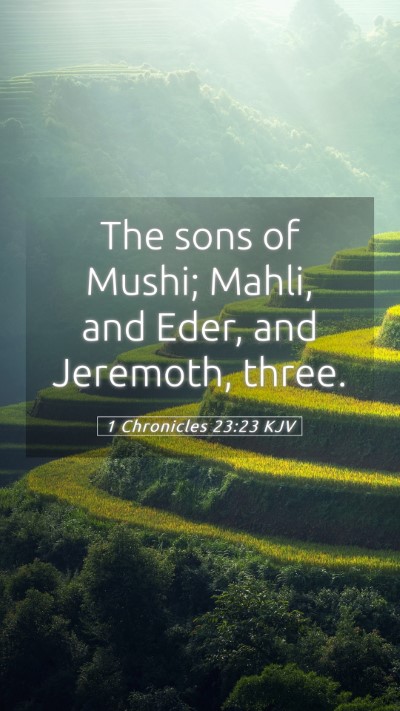Understanding 1 Chronicles 23:23
Bible Verse: 1 Chronicles 23:23
Verse Quote: "And the sons of Merari were counted by their genealogies, according to their families, by the house of their fathers." (1 Chronicles 23:23, KJV)
Summary of the Verse
This verse emphasizes the process of organization within the Levitical priesthood, particularly focusing on the descendants of Merari. It illustrates the importance of genealogy in Israel's worship and the structured approach to serving in the temple. The Levitical families were set apart by their lineage and roles in the religious activities of the nation, highlighting the sacred duty assigned to each branch of the tribe of Levi.
Bible Verse Meanings and Interpretations
The significance of 1 Chronicles 23:23 can be understood through various public domain commentaries:
-
Matthew Henry:
Henry's commentary underscores the meticulous nature of God's order in establishing the priesthood. Each family within the Levites had delineated duties and a distinct lineage that specified their roles in worship, which reflects God's divine order in spiritual service.
-
Albert Barnes:
Barnes interprets this verse as part of the broader organization of the Levites, noting the historical significance of tribal genealogies in maintaining the integrity of priestly duties. This record serves not only a functional purpose but also asserts the legitimacy of the worship practices among the Israelites.
-
Adam Clarke:
Clarke highlights that the sons of Merari, one of the three main divisions of the Levites, were especially tasked with the care of the more burdensome elements of the tabernacle. By recording these genealogies, the passage emphasizes the continuity of service and the essential roles played by the various families in the worship of God.
Insights on Biblical Exegesis
The verse invites a deeper analysis concerning the value of lineage and structure in biblical worship. Understanding genealogies, as highlighted in this passage, informs us about:
- Theological Significance: God’s order and structure in worship demonstrate His holiness. The careful recording of genealogies denotes a divine call for holiness in the congregation.
- Cultural Context: In ancient Israel, genealogies were fundamental in establishing rights and responsibilities, including land inheritance and religious duties.
- Prophetic Fulfillment: The returning exiles from Babylon were reminded of their lineage, reinforcing their identity and purpose in rebuilding the temple and the nation.
Application and Relevance to Daily Life
1 Chronicles 23:23 carries practical applications for today’s believers:
- Understanding the importance of structure and order in our spiritual lives can lead to greater effectiveness in ministry and worship.
- Recognizing one's spiritual heritage can inspire us to serve faithfully in our communities and congregations.
- By acknowledging our collective calling to serve in diverse capacities, we can build a stronger, more unified body of Christ.
Cross-References
This verse is related to several other passages that reinforce its themes:
- Exodus 6:19: Details the genealogies of the Levi tribe.
- Numbers 3:17-20: Provides the division of duties among the Levites.
- 1 Chronicles 24:4: Discusses the divisions of the Levitical priesthood.
- Ezra 8:1-2: Records the genealogies of those who returned from Babylon.
- Luke 3:24: Describes the genealogy of Jesus, emphasizing the importance of lineage.


